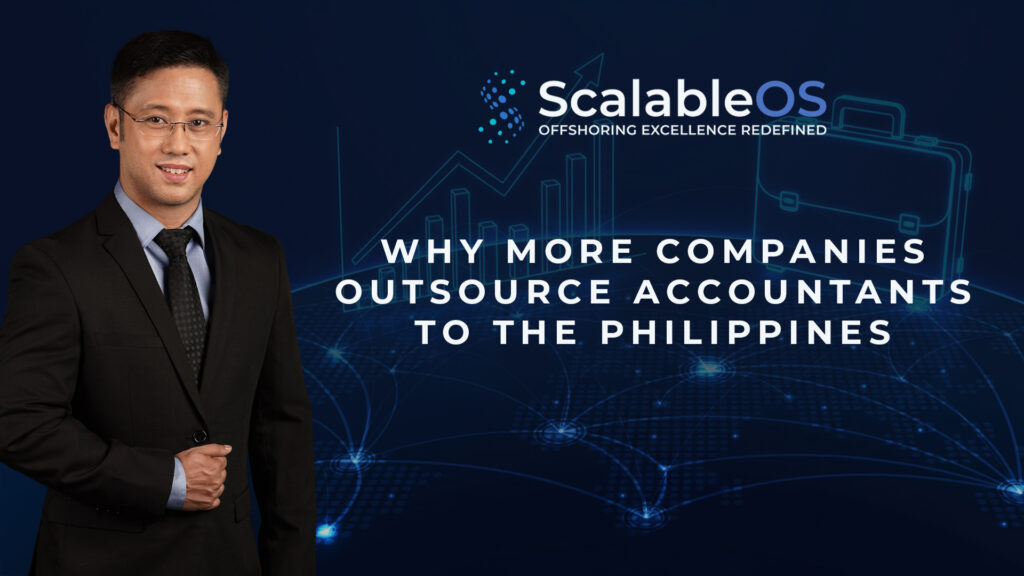Demand for skilled accountants is rising worldwide as companies face shrinking talent pools and mounting operational pressures.
In the United States, the challenge is sharper: fewer students are pursuing accounting, veteran CPAs are retiring, and smaller firms are joining larger practices. These shifts create a perfect storm of rising costs and limited expertise.
Fortunately, the Philippines steps in with a deep pool of globally trained, English-proficient professionals. But you may wonder: is it worth outsourcing accounting?
This article explores why Filipino accountants are essential for business, why you should outsource accounting to the Philippines, and how to select the right partner for long-term success.
What is Industry Pain Points Driving Accounting Outsourcing?
The decision to outsource accounting in the Philippines doesn’t happen in a vacuum. Many U.S. firms are opting for offshore support to mount structural and operational pressures, such as:
A shrinking talent pipeline
The U.S. accounting profession is experiencing a well-documented labor shortage. The AICPA’s 2023 Trends Report shows fewer students are earning accounting degrees, with bachelor’s degrees down 7.8% and master’s degrees down 6.4% in the 2021-22 school year.
Retirements among experienced CPAs are also accelerating. In effect, fewer qualified professionals are entering the workforce just as demand for financial expertise continues to climb.
Mid-sized firms and corporate finance teams face open roles, slow hiring, and heavier workloads. When deadlines hit, they’re forced to either overwork staff or let clients down, neither of which is sustainable.
Industry consolidation and its ripple effects
Many CPA firms are also entering mergers and acquisitions. Larger companies continue to absorb smaller practices, creating efficiencies at scale but leaving gaps in the market. Small and mid-sized businesses that once relied on local firms for personalized service now feel underserved or priced out.
For independent firms, this shift is both an opportunity and a challenge. They need to keep giving clients the same fast, accurate service but with fewer resources. Outsourced accountants in the Philippines can help by providing flexible support without the high cost of full-time staff.
Rising operational costs
Rising business costs are worsening labor shortages. In the U.S., accountant salaries have climbed to over $80,000 a year, with top firms paying even more for specialized roles. Factor in healthcare, retirement contributions, training, and office overhead, and the financial burden on employers grows even heavier.
Smaller firms and finance teams often can’t match the big pay packages larger employers offer. Outsourcing provides a cost-effective alternative, allowing companies to maintain high-quality accounting support without blowing up their budget.
Struggling with technology adoption
The rapid evolution of accounting technology is both a blessing and a burden. Tools like QuickBooks Online, Xero, NetSuite, and SAP—along with AI-driven platforms—can dramatically improve efficiency. But many firms don’t have the right people to implement, integrate, and maintain these systems effectively.
This gap leaves them stuck between manual, error-prone workflows and underutilized tech investments. Outsourced accounting in the Philippines often supplies talent trained on these platforms, helping you maximize your technology spend without the high cost of U.S. hires.
Seasonal workload spikes
Finally, the cyclical nature of accounting adds another layer of complexity. Tax season, year-end reporting, and audit deadlines create predictable but intense surges in demand. Hiring seasonal staff can fill the gaps, but onboarding costs are high, and temporary workers may lack the specialized knowledge required to meet compliance standards.
This stop-start approach not only drains resources but also jeopardizes service quality. Firms with offshore teams get skilled staff they can scale up or down as needed, keeping work consistent during busy and slow periods.
Why the Philippines is a Top Destination for Outsourced Accounting?
Talent shortages, rising costs, and tech gaps are driving U.S. firms to look abroad. The Philippines stands out with the following benefits.
Cost efficiency without compromising quality
Accounting salaries in the U.S. continue to rise, yet the Philippines offers skilled professionals at much lower cost. That doesn’t necessarily mean lower quality, as Filipino accountants often have the same certifications as their American counterparts.
If you have tight margins or unpredictable workloads, you can use the savings from outsourcing to invest in technology, client service, or strategic growth initiatives.
A strong and growing talent pipeline
Unlike the U.S., where fewer students are studying accounting, the Philippines produces thousands of new accountants yearly. Many earn local CPA licenses, and more are passing the U.S. CPA exam through university partnerships.
This steady flow of talent means that if you’re looking to outsource accounting to the Philippines, you won’t face the same bottlenecks you encounter locally.
Mastery of global accounting standards
Filipino accountants aren’t limited to domestic frameworks. They’re trained in International Financial Reporting Standards (IFRS), U.S. Generally Accepted Accounting Principles (GAAP), and international tax regulations.
This global perspective allows them to work with American firms and multinational corporations that require compliance across multiple jurisdictions.
English proficiency and cultural alignment
Clear communication is essential in accounting because misunderstandings can lead to costly errors. The Philippines ranks high in Asia for English proficiency, with strong writing and verbal skills that make collaboration straightforward.
Filipino accountants are also familiar with Western business practices, often work U.S. hours, and follow a client-first approach. These capabilities make cross-country collaboration smooth and reliable.
A mature outsourcing ecosystem
The Philippines is a trusted global outsourcing hub with decades of experience in BPO and finance support. It has the infrastructure, compliance standards (ISO, GDPR), and secure data centers to keep financial data safe.
Beyond labor, the country offers scalable teams, specialized training programs, and industry-focused expertise that can help you maintain high performance while navigating rapid growth. If you’re worried about the risks of offshoring, the Philippines’ mature market offers peace of mind.
What are Common Accounting Tasks You Can Outsource to the Philippines?
You may wonder: What exactly can I delegate? You can outsource the following tasks to free up your in-house teams for higher-value work without worrying about accuracy, compliance, or timeliness.
1. Bookkeeping, payroll, and accounts payable/receivable
Accurate and up-to-date records are the backbone of any finance team. Filipino accountants handle daily bookkeeping tasks such as journal entries, expense tracking, and bank reconciliations. They can also manage payroll and benefits, and streamline accounts payable and receivable to keep invoices on track and cash flow healthy.
These support services can benefit you if you juggle multiple vendors or clients.
2. Tax preparation and filing
Tax compliance takes time and carries a high risk for U.S. businesses. Good thing Philippine-based accountants are trained in both local and international tax regulations. They can assist you with U.S. federal and state filings and global reporting requirements.
Offshore teams also often handle data gathering, calculations, and document prep, while U.S. advisors review and finalize. This setup eases tax season workloads and lowers compliance risks.
3. Financial statement preparation and monthly reporting
Filipino accountants prepare balance sheets, income statements, and cash flow reports on time, following U.S. GAAP or IFRS. Their work turns raw data into clear reports and tracks performance trends without overloading your in-house team. In effect, you gain accurate financial reports that can help you make informed decisions.
4. Budget forecasting, audit support, and reconciliations
Planning for the future requires more than just tracking historical data. Filipino accountants help create budgets, run variance analyses, and support forecasts. They also gather documents and reconcile accounts to prepare for audits.
Additionally, many firms outsource bank reconciliations and compliance checks to reduce errors and missed discrepancies.
5. Virtual CFO services for startups and SMEs
If you currently can’t hire a full-time CFO, the Philippines offers virtual CFO services. These senior professionals provide financial oversight, cash flow management, and strategic advice at much lower cost. You gain data-driven insights and support for funding without the burden of a high salary.
How to Choose the Right Accounting Partner in the Philippines?
Choosing the right outsourcing partner matters as much as the decision to outsource. With many accounting providers in the Philippines, you need to spot reliable ones and avoid those weak on quality or security. Here are some things to consider.
1. Check certifications and expertise
A reputable firm should employ licensed CPAs, accounting graduates, and finance specialists with proven track records. If your industry has special needs—like healthcare, retail, or tech—check that the outsourcing partner has worked in those areas. Certifications show more than credentials; they reflect professionalism and ongoing learning.
2. Understand their tech stack
Modern accounting depends on software, so your outsourcing partner should know the tools you use. Many Filipino accountants work with QuickBooks, Xero, NetSuite, SAP, and cloud platforms. Ask about their skills in automation and AI, too. Partners who fit smoothly into your workflows save time and ease the transition.
3. Ask about data security and compliance protocols
Outsourcing involves sharing sensitive data, so security is critical. Strong providers follow global standards like ISO, GDPR, or SOC 2 and use strict access controls, secure storage, and staff training. The right partner will be open about their policies and able to prove compliance.
4. Look for cultural compatibility and communication practices
Technical skills are essential, but day-to-day collaboration hinges on communication. Filipino accountants have strong English skills, but you should ask how they share updates and reports. Do they send weekly progress reports? How do they handle onboarding and training? What tools do they use—email, Slack, video calls?
Clear processes make it easier for your team to trust and work with offshore staff.
5. Choose flexibility and proven success
Pick a provider with flexible services, whether you need bookkeeping, payroll, tax prep, or forecasting. Scalable options let you adjust as your needs change. Check client testimonials and case studies, too. Success stories validate expertise and highlight how the firm approaches problem-solving and long-term relationships.
The Future of Accounting is Collaborative
Accounting drives smarter, faster business decisions, but it’s often a tedious and time-consuming process. Fortunately, outsourcing can give you the flexibility to handle talent shortages, rising costs, and regulatory complexity without sacrificing accuracy or control. The Philippines is also one of the world’s most reliable partners for this shift.
As an experienced offshoring company in the Philippines, ScalableOS specializes in delivering tailored solutions that align with your business goals. From basic bookkeeping to complex outsourced finance and accounting services, we can integrate seamlessly into your operations and drive measurable value.
Take the first step toward a stronger financial future! Inquire with ScalableOS today.
FAQs
1. What are outsourced accountants in the Philippines?
2. Why do U.S. companies outsource accounting to the Philippines?
3. What tasks can be outsourced to Filipino accountants?
4. How do Filipino accountants ensure U.S. compliance?
5. How do I choose the right accounting partner in the Philippines?
6. What technology skills should outsourced accountants have?
7. How can I ensure data security with an offshore accounting team?

Chris Van Vladricken
Chris is the CEO and Co-Founder of ScalableOS, with over 18 years of experience in both Philippines offshoring and Information Technology. A longtime member of EO Seattle, he’s passionate about building high-impact teams that help businesses grow while creating meaningful opportunities in the Philippines. His people-first approach drives the company’s mission to deliver tailored, strategic offshoring solutions that help businesses scale smarter.




